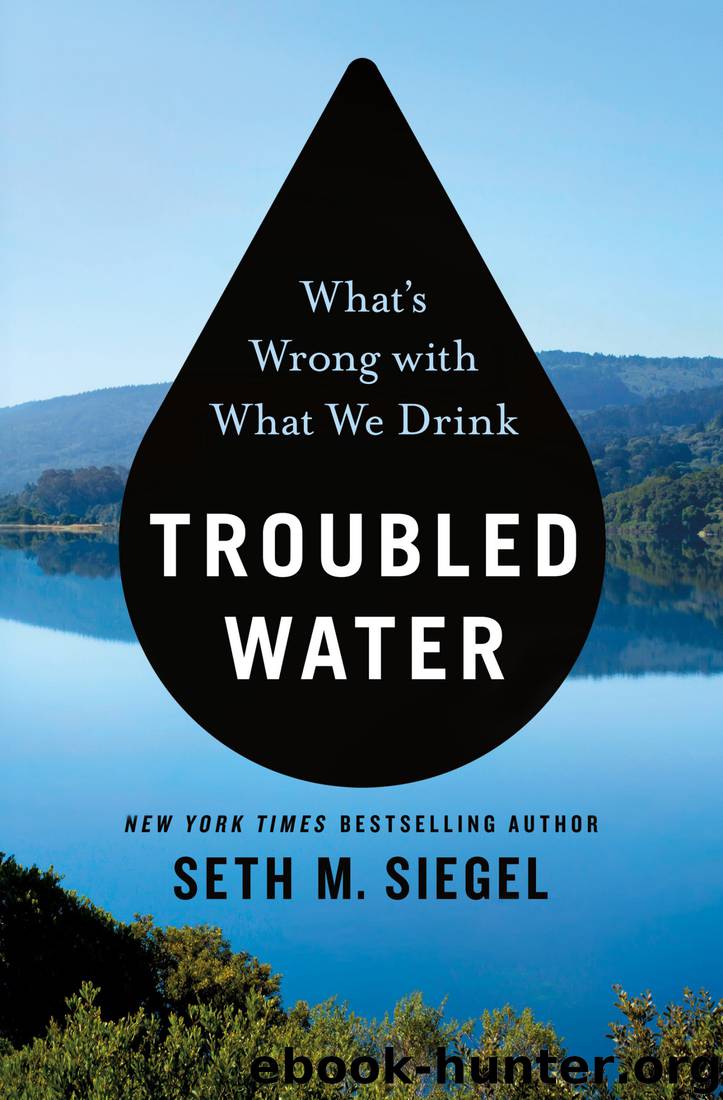Troubled Water by Seth M. Siegel

Author:Seth M. Siegel
Language: eng
Format: epub
Publisher: St. Martin's Publishing Group
The Wildly Varied Cost of Drinking Water
Since it is a universal need and a basic government service, as a point of argument, it isn’t clear why anyone is obliged to pay for their drinking water. Other than in rare cases, there’s no direct charge for police or fire protection or nearly any other municipal service used by everyone. Even if someone has a burglary that requires a detective’s visit or a fire that brings out a fire engine and a company of firefighters, there is almost never a fee assessed for that service.40 More to the point, no one is charged for the water used to fight that fire, even though it traverses the identical pipes as the water that comes out of the tap in every home. So why should there be a charge for the water in the house when there is none for the same water from the fire hydrant?
Of course, if there were no water fees, usage of water would almost certainly rise and likely even more of it would be wasted. In addition, if there were no water fees, the quality of the system would drop or taxes would have to rise significantly because water can never actually be free.
Rain, when it falls, is free, but every other part of getting water to people’s homes doesn’t come without an outlay of funds. The price charged for water helps to defray the costs of capturing, cleaning, and transporting it as well as all of the planning and administration that goes into all of that. And since water usage can be measured, the idea of everyone paying for what they use grew along with the development of water meters. Still, the public isn’t asked to pay tuition costs for their children to go to public schools, and that, too, is a measurable cost.
The practice of charging for water began as a legacy from the first water companies in the U.S. in the early 1800s. As previously noted, most of the nineteenth-century water providers were private companies, offering a valued service in places where well water was hard to access or had grown polluted. When municipalities began taking over the role of the private, for-profit operators, townspeople were accustomed to paying, so mayors and city councils continued to charge, something of special value given the excess revenue it provided that could be added to taxes to pay for civic services.
Today, about 85 percent of all U.S. water utilities are connected to municipal government. Regardless of ownership, though, there is no uniform price for drinking water in the U.S. Prices vary wildly, and many public water utilities charge far more than private ones. Even within the universe of public water utilities, there is no standard price or obvious logic to what is charged. Phoenix is a fast-growing city located in a desert. It might be expected to have a higher average water bill than, say, water-rich cities on either coast, such as Boston or San Francisco. But that isn’t the case.
Download
This site does not store any files on its server. We only index and link to content provided by other sites. Please contact the content providers to delete copyright contents if any and email us, we'll remove relevant links or contents immediately.
The Secret History by Donna Tartt(16621)
The Social Justice Warrior Handbook by Lisa De Pasquale(11489)
Thirteen Reasons Why by Jay Asher(7788)
This Is How You Lose Her by Junot Diaz(5769)
Weapons of Math Destruction by Cathy O'Neil(5036)
Zero to One by Peter Thiel(4824)
The Myth of the Strong Leader by Archie Brown(4789)
Promise Me, Dad by Joe Biden(4447)
Beartown by Fredrik Backman(4415)
Stone's Rules by Roger Stone(4415)
How Democracies Die by Steven Levitsky & Daniel Ziblatt(4398)
The Fire Next Time by James Baldwin(4342)
100 Deadly Skills by Clint Emerson(4076)
A Higher Loyalty: Truth, Lies, and Leadership by James Comey(4032)
Rise and Kill First by Ronen Bergman(4012)
The David Icke Guide to the Global Conspiracy (and how to end it) by David Icke(3881)
The Farm by Tom Rob Smith(3872)
Secrecy World by Jake Bernstein(3782)
The Doomsday Machine by Daniel Ellsberg(3730)
